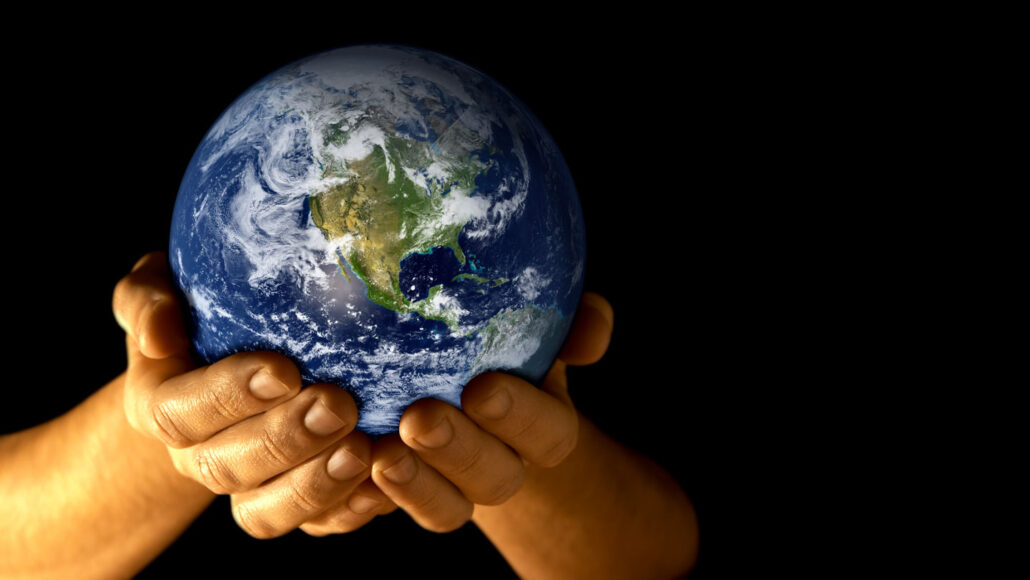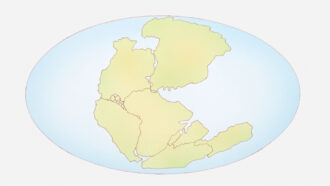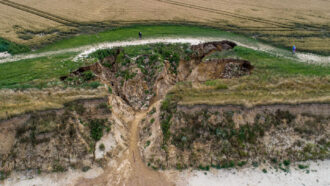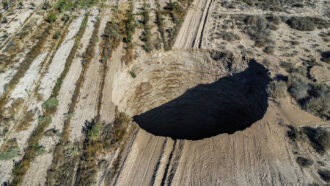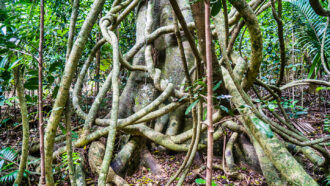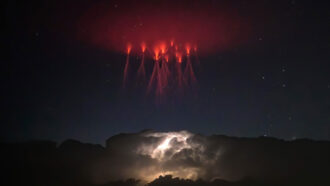acidic: An adjective for materials that contain acid. Acidic materials often are capable of dissolving some minerals such as carbonate, or preventing their formation in the first place.
Anthropocene: Term coined by scientists to describe the age in which humans have been the strongest force of change on the planet. It is generally believed to date from at least the dawn of the Nuclear Age (in the middle 1940s), and possibly even earlier — from the beginning of the Industrial Revolution in the early 1800s.
asteroid: A rocky object in orbit around the sun. Most asteroids orbit in a region that falls between the orbits of Mars and Jupiter. Astronomers refer to this region as the asteroid belt.
atmosphere: The envelope of gases surrounding Earth, another planet or a moon.
atomic: Having to do with atoms, the smallest possible unit that makes up a chemical element.
climate: The weather conditions that typically exist in one area, in general, or over a long period.
debris: Scattered fragments, typically of trash or of something that has been destroyed. Space debris, for instance, includes the wreckage of defunct satellites and spacecraft.
epoch: (in geology) A span of time in the geologic past that was shorter than a period (which is itself, part of some era ) and marked when some dramatic changes occurred.
eruption: (in geoscience) The sudden bursting or spraying of hot material from deep inside a planet or moon and out through its surface. Volcanic eruptions on Earth usually send hot lava, hot gases or ash into the air and across surrounding land. In colder parts of the solar system, eruptions often involve liquid water spraying out through cracks in an icy crust. This happens on Enceladus, a moon of Saturn that is covered in ice.
extinction: The permanent loss of a species, family or larger group of organisms.
fossil fuel: Any fuel — such as coal, petroleum (crude oil) or natural gas — that has developed within the Earth over millions of years from the decayed remains of bacteria, plants or animals.
fuel: Any material that will release energy during a controlled chemical or nuclear reaction. Fossil fuels (coal, natural gas and petroleum) are a common type that liberate their energy through chemical reactions that take place when heated (usually to the point of burning).
geological: Adjective to describe things related to Earth’s physical structure and substance, its history and the processes that act on it. People who work in this field are known as geologists.
greenhouse gas: A gas that contributes to the greenhouse effect by absorbing heat. Carbon dioxide is one example of a greenhouse gas.
Holocene: The current period in geologic time. Meaning “entirely recent,” the Holocene began at the end of the last ice age, 11,700 years ago, and continues to the present time.
ice age: Earth has experienced at least five major ice ages, which are prolonged periods of unusually cold weather experienced by much of the planet. During that time, which can last hundreds to thousands of years, glaciers and ice sheets expand in size and depth. The most recent ice age peaked 21,500 years ago, but continued until about 13,000 years ago.
Industrial Revolution: A period of time around 1750 that was marked by new manufacturing processes and a switch from wood to coal and other fossil fuels as a main source of energy.
planet: A large celestial object that orbits a star but unlike a star does not generate any visible light.
plastic: Any of a series of materials that are easily deformable; or synthetic materials that have been made from polymers (long strings of some building-block molecule) that tend to be lightweight, inexpensive and resistant to degradation.
radioactive: An adjective that describes unstable elements, such as certain forms (isotopes) of uranium and plutonium. Such elements are said to be unstable because their nucleus sheds energy that is carried away by photons and/or and often one or more subatomic particles. This emission of energy is by a process known as radioactive decay.
